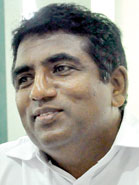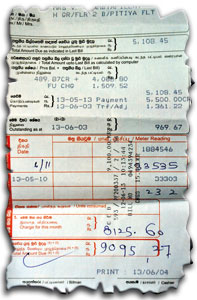News
Power bills triple, users at a loss for answers
The new electricity tariff has tripled power bills across the board, from domestic users to service providers. Domestic consumers complain that even when they have kept usage to the reduced-rate band of 60-180 units their bills have shot up. Business owners stress that they are sacrificing net profits in order to meet the higher charges, and say custom would fall off if they were to increase the price of their services to recoup the losses.
 B. Shahzad, textile shop owner: A Rs. 3000 increase in his latest bill |
 S. Prabaharan, director of a vegetarian restaurant in Bambalapitiya. Pix by Susantha Liyanawatte |
 Ranjan Silva: Forced to reduce his staff after bill increases by a whopping Rs. 26,000 |
W. Shu 54, a resident of Wellawatte, was one of many consumers who found that his bill had risen despite using less power: he used 179 units in April and was charged Rs 3817 but despite cutting down on power consumption to 164 units the following month, his bill had risen to Rs 4473.
“We were very careful but even so there’s been an increase in the bill,” he said. “It seems like there’s no point in curbing power use.”
T. Vijeyadevi, 80, a resident of Bambalapitiya said her bill had increased three-fold under the new tariff system. Her bill for June had amounted to Rs 8125 for 232 units but under the old system her bill for April had been Rs.5776 for 220 units.
“There are only two people living in our house and we have reduced the use of electrical items, yet the charges have risen. We only use the fan as it is essential,” she added. “The government is spending billions of rupees for other activities; they have to think of the people of the country too,” she complained.
“On the one hand the prices of goods are going up, and on the other, utility charges are being increased. This will directly affect middle-class families and the low income earners.”The business community complains that it is difficult to pay the increased electricity bills when there is less profit and the cost of production is high.
B. Shahzad, 34, a textile shop owner from Pettah, said he had experienced a Rs. 3000 increase in his latest electricity bill, from Rs.14,000 to Rs.17,000. “We have cut down on consumption. We mostly avoid using the air conditioner as a large amount of electricity is wasted there – but to our surprise our bill still went up,” he said.

T. Vijeyadevi, 80, a resident of Bambalapitiya said her bill had increased three-fold under the new tariff system.
He could not pass on the cost burden to customers as this would lead to lower patronage of his shop. S. Prabaharan, director of a vegetarian restaurant in Bambalapitiya, said his enterprise depended on grinders, ventilation fans and ceiling fans – all of which use power – to function satisfactorily. His latest electricity bill had risen by Rs.20,000.
“We cannot pass the electricity burden to the customers as our business has a lot of competition and sales will drop,” Mr. Prabhaharan said. He was looking to reduce the use of ventilation fans. When asked whether he would be cutting staff to save on costs, Mr. Prabaharan said he was not in a position to do so as the current number of employees was necessary to run the business well.
Susil Beneragama, 43, an accountant of a vehicle servicing centre in Kohuwala, said he would have to increase charges in order to meet the annual cost-of-living pay rise to his employees.
His electricity bill had increased by 40 per cent from April, creating a huge burden for the business. Ranjan Silva, 50, owner of a studio in Wellawatte, said that with his business badly affected by the higher rate, he had decided not to recruit more employees and might even have to reduce his staff. His bill had gone up by almost Rs. 26,000 when the new rate took effect.
“Customers complain as we are now switching off the air-conditioner most of the time to keep electricity consumption down, but they don’t understand that we cannot balance our books if the bills go higher,” he said.
He had reduced number of working hours in order to save electricity and said he would not be able to give his employees a pay rise because of the new tariff.
Follow @timesonlinelk
comments powered by Disqus

